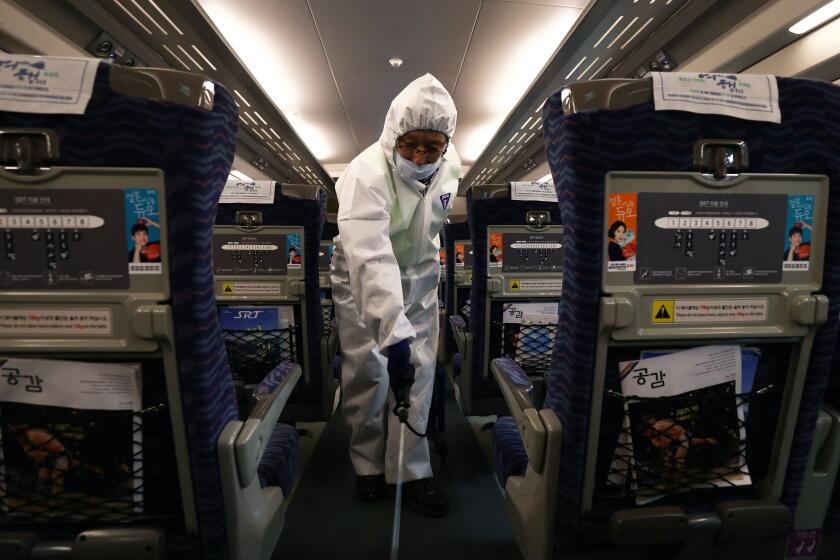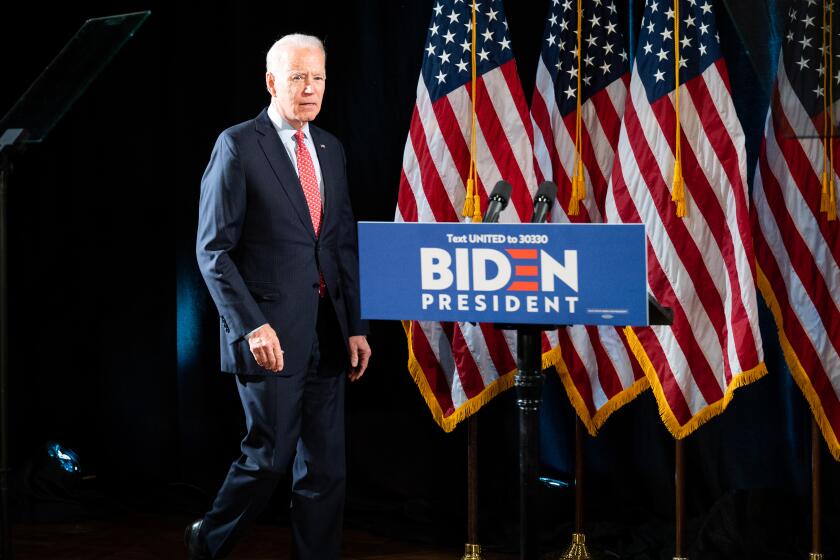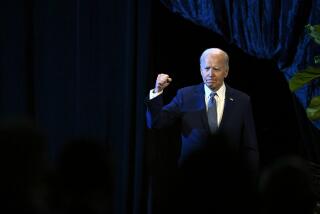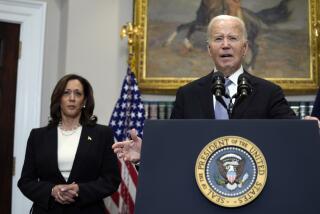5 takeaways from Tuesday’s Democratic primary elections
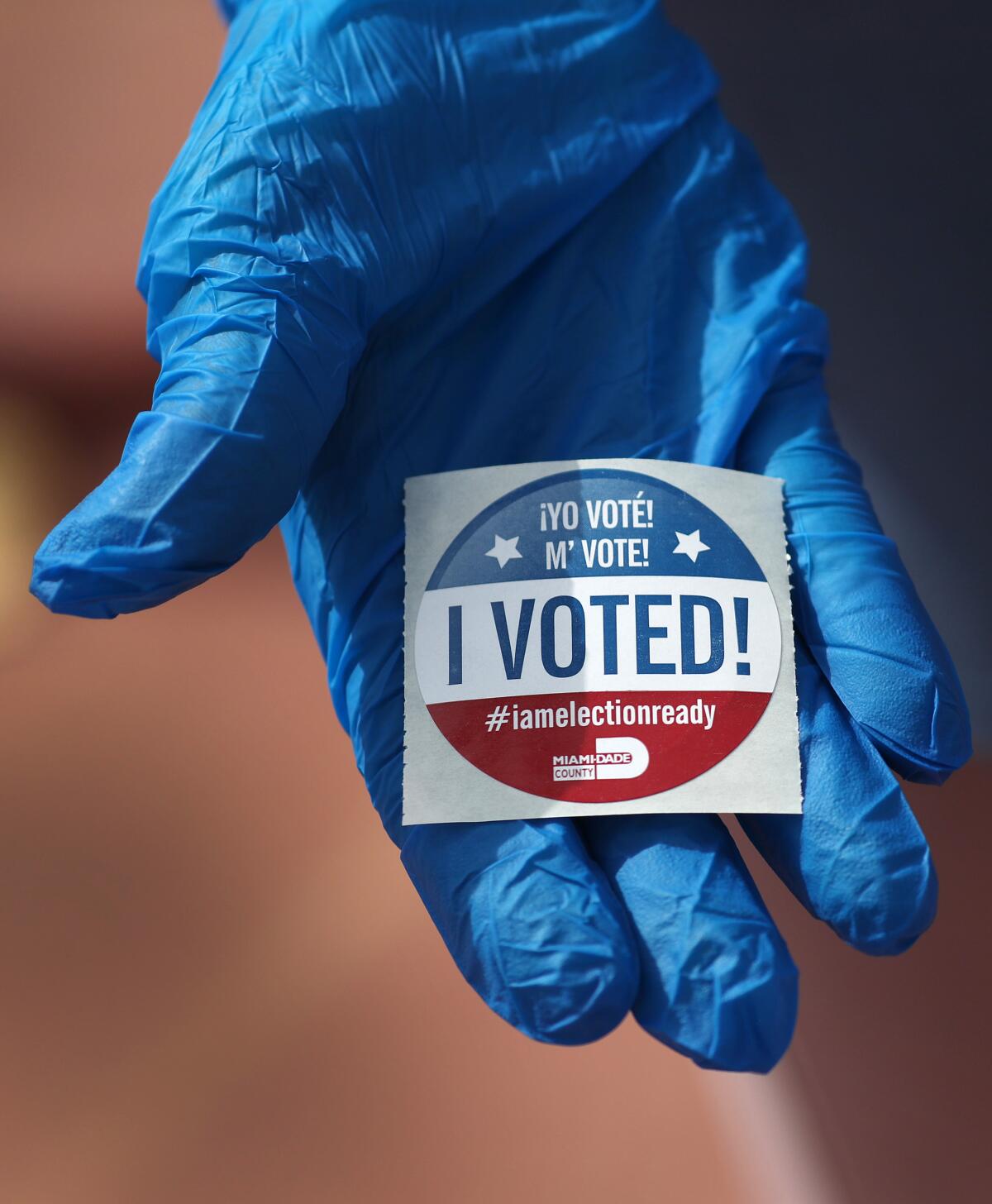
- Share via
Democracy in the time of a global pandemic is a messy thing — but it still marched on Tuesday.
Well, mostly marched on. With Ohio officials deciding in a dizzying series of last-minute orders to call off in-person voting, the focus turned to the remaining three states holding contests: Florida, Illinois and Arizona.
The coronavirus outbreak upended the process of voting, with volunteers scheduled to work the polls not showing up amid concerns about the disease.
But it did not dramatically reshape the Democratic presidential race, with former Vice President Joe Biden remaining the odds-on favorite to clinch the nomination.
Here are the key takeaways from tonight’s results:
Sanders’ path continues to narrow
After two weeks of grueling losses, Bernie Sanders needed to significantly shift the trajectory of this race to justify his continued candidacy.
He failed to land a knockout blow in his one-on-one debate with Biden on Sunday. And the crush of coronavirus news has drowned out much interest in the presidential election.
The results from Tuesday’s ballotingshow the Vermont senator didn’t get what he needed.
Instead, Biden notched a decisive win in Florida, the biggest delegate prize of the evening, which landed in his win column as soon as all polls closed in the state. Biden later won in Illinois; the Associated Press projected his victory about 30 minutes after most polls closed there.
He then completed the sweep with a win in Arizona.
That means Sanders will need to win about 60% of the remaining delegates to win the nomination, an exceedingly uphill climb given the math and momentum in Biden’s favor.
Coronavirus anxieties cut in Biden’s favor
“Which candidate would you trust to handle a major crisis” is the type of question pollsters ask voters all the time, usually as a hypothetical exercise.
Now, that question has very real implications — and voters appear to be siding with the former vice president.
A poll on Tuesday of Florida, Arizona and Illinois voters found that respondents in all three states picked Biden over Sanders as the leader they’d prefer in a disaster. It wasn’t even close — the slimmest margin was in Arizona, where voters sided with Biden on that question by 32 percentage points.
The poll was conducted for the major television news networks and surveyed voters prior to Tuesday’s vote. There were no in-person interviews at polling places, as are typical in exit polls, because of the coronavirus.
Governments and health officials around the world are trying to mitigate the spread of the coronavirus outbreak.
Biden improves his Latino support...
Even as Biden improbably turned around his campaign, there was always a glaring gap in his coalition: his soft support among Latino voters.
Sanders prioritized winning the support of Latino voters in his campaign strategy, and in the early states, it showed. In places like Nevada and Texas, Sanders racked up double-digit leads over Biden among that demographic.
But Tuesday’s contests showed a notable improvement for Biden on that front.
In Florida, analysis by UCLA’s Latino Policy and Politics Institute found that Biden outperformed Sanders in heavily Cuban American precincts in Miami-Dade county by 20 points, and racked up similar margins in neighborhoods with large Venezuelan American populations.
Biden was likely aided there by lingering anger over Sanders’ comments praising elements of Fidel Castro’s communist revolution in Cuba, even though he denounced the regime’s “authoritarian nature.”
Further west, where Latino voters don’t have the personal connection to Cuban politics, Biden also made some improvements. In Arizona, he tied Sanders among Latino voters, according to polling.
...But still has to catch up with young voters
Another weak spot for Biden has remained young voters, and that held true in the most recent contests.
Sanders won the support of 66% of voters younger than 45 in Illinois, 71% in Arizona and 52% of that group in Florida.
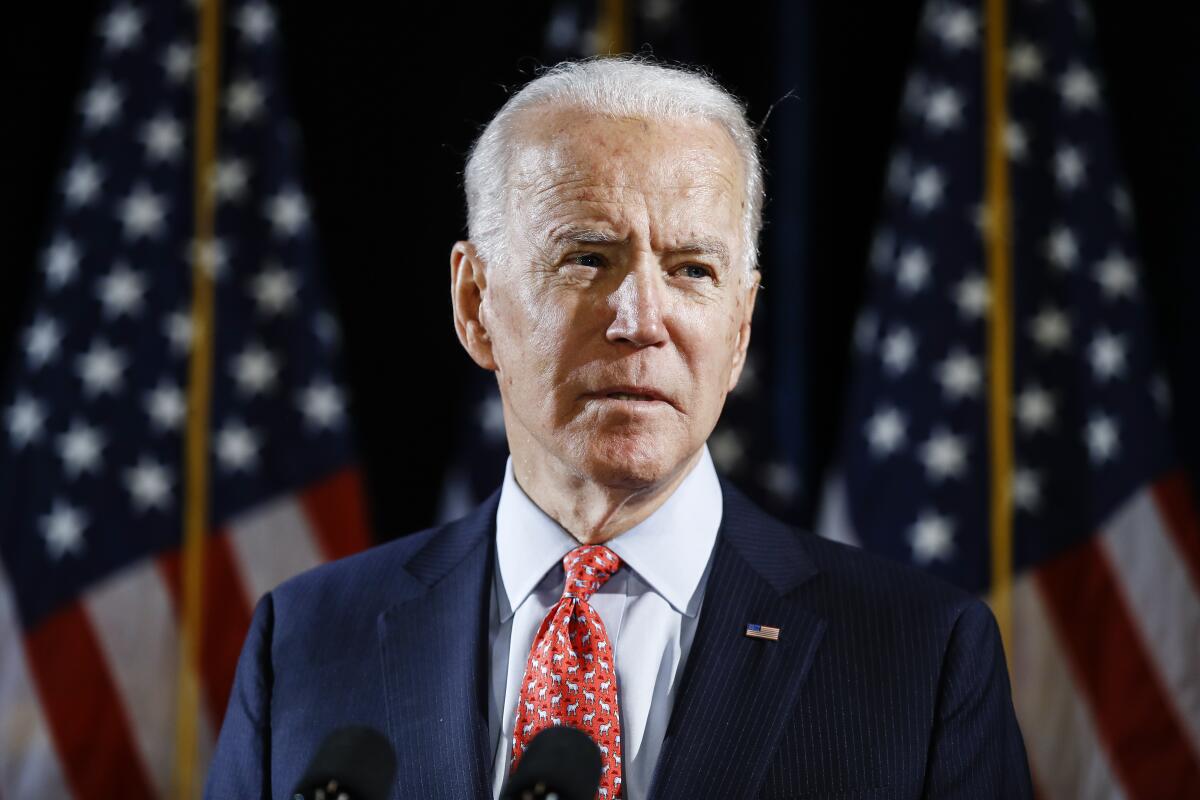
Biden, speaking from his Wilmington, Del., home after the bulk of the results rolled in, made a concerted effort to reach out to Sanders’ youthful supporters by acknowledging his rival’s ideological influence.
“Senator Sanders and his supporters have brought a remarkable, passionate tenacity to all of these issues. Together, they have shifted the fundamental conversation in this country,” Biden said. “So let me say, especially to the young voters who have been inspired by Senator Sanders: I hear you. I know what’s at stake. I know what we have to do.”
To vote or not to vote?
The scenes from the polling places on Tuesday were not a shining example of democracy in action. Some voters in Illinois waited in hours-long lines in cramped spaces, running counter to the social distancing recommended by experts to stop the coronavirus’ spread. In some cases, polling places at nursing homes were moved to alternate locations to protect residents, but the last-minute change made it too late for those voters to request mail-in ballots.
The bumpy election day — marked by confusion over closed polling places — could leave some feeling like the results are a flawed glimpse into the preferences of Democratic voters.
The Sanders camp depicted the decision to hold the contests as detrimental to public health. The campaign did not do any traditional get-out-the-vote efforts, and a spokesman said going to the polls amid the outbreak was a “personal decision,” hardly the usual language urging for every last vote.
Joe Biden hopes to effectively wrap up the Democratic primary contest against a flagging Bernie Sanders after wins in Arizona, Florida and Illinois.
In a livestreamed address from Washington, D.C., before most polls closed, Sanders did not make any mention of the night’s contest and focused instead on proposals to combat the coronavirus, including a call for $2,000 in monthly cash payments for every American household for the duration of the crisis.
“We can address this crisis,” Sanders said. “We can minimize the pain. Let us do just that.”
The Biden campaign, eager to wrap this primary up, sounded a different note. In a memo released on Tuesday before polls closed, Biden’s deputy campaign manager noted the country had held elections during the Civil War, the 1918 flu pandemic and World War II. And, she added, a robust early vote in states like Florida, where nearly 1.1 million ballots were cast in the Democratic primary before Tuesday, showed that plenty of people got to express their choice.
In short, Team Biden’s message was that despite the unusual circumstances, Tuesday’s results are still legitimate.
More to Read
Get the L.A. Times Politics newsletter
Deeply reported insights into legislation, politics and policy from Sacramento, Washington and beyond. In your inbox three times per week.
You may occasionally receive promotional content from the Los Angeles Times.
